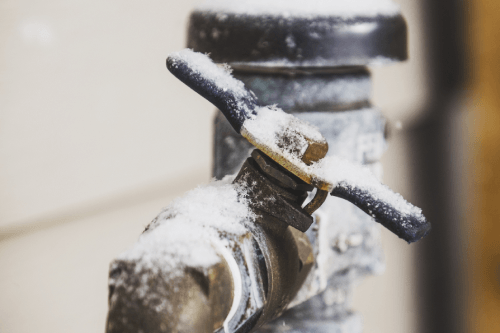Avoiding Frozen Plumbing in Winter: Professional Advice
Avoiding Frozen Plumbing in Winter: Professional Advice
Blog Article
They are making a few great pointers regarding Winter Plumbing Precautions: Preventing Frozen Pipes overall in the content just below.

Cold weather can damage your pipes, particularly by freezing pipelines. Below's how to avoid it from happening and what to do if it does.
Intro
As temperatures drop, the risk of frozen pipelines increases, possibly leading to costly repair services and water damages. Recognizing just how to prevent frozen pipes is crucial for property owners in chilly climates.
Avoidance Tips
Protecting prone pipes
Wrap pipelines in insulation sleeves or use warmth tape to safeguard them from freezing temperature levels. Focus on pipelines in unheated or exterior locations of the home.
Home heating methods
Maintain interior areas sufficiently warmed, especially areas with plumbing. Open up cupboard doors to enable warm air to flow around pipelines under sinks.
Exactly how to determine frozen pipelines
Search for lowered water circulation from taps, unusual odors or noises from pipes, and visible frost on subjected pipelines.
Long-Term Solutions
Structural adjustments
Think about rerouting pipes away from outside wall surfaces or unheated locations. Add additional insulation to attics, basements, and crawl spaces.
Upgrading insulation
Invest in top quality insulation for pipes, attic rooms, and wall surfaces. Proper insulation aids preserve constant temperature levels and reduces the threat of frozen pipes.
Securing Outside Plumbing
Garden pipes and outside faucets
Detach and drain garden hoses prior to winter. Install frost-proof spigots or cover exterior faucets with insulated caps.
Recognizing Frozen Pipes
What creates pipes to freeze?
Pipelines ice up when exposed to temperatures listed below 32 ° F (0 ° C) for expanded durations. As water inside the pipelines freezes, it expands, putting pressure on the pipe walls and potentially triggering them to rupture.
Dangers and problems
Icy pipelines can cause water disturbances, home damage, and expensive repair work. Burst pipelines can flooding homes and cause extensive architectural damages.
Indications of Frozen Pipes
Recognizing frozen pipes early can avoid them from bursting.
What to Do If Your Pipelines Freeze
Immediate activities to take
If you suspect icy pipelines, keep taps available to alleviate pressure as the ice thaws. Make use of a hairdryer or towels taken in hot water to thaw pipelines slowly.
Final thought
Avoiding icy pipelines needs proactive measures and fast reactions. By comprehending the causes, indications, and safety nets, property owners can secure their pipes throughout winter.
Helpful Tips to Prevent Frozen Pipes this Winter
UNDERSTANDING THE BASICS: WHY PIPES FREEZE AND WHY IT’S A PROBLEM
Water freezing inside pipes is common during the winter months, but understanding why pipes freeze, and the potential problems it can cause is crucial in preventing such incidents. This section will delve into the basics of why pipes freeze and the associated problems that may arise.
THE SCIENCE BEHIND FROZEN PIPES
When water reaches freezing temperatures, it undergoes a physical transformation and solidifies into ice. This expansion of water as it freezes is the primary reason pipes can burst. As the water inside the pipe freezes, it expands, creating immense pressure on the walls. If the pressure becomes too great, the pipe can crack or rupture, leading to leaks and water damage.
FACTORS THAT CONTRIBUTE TO PIPE FREEZING
Low Temperatures: Extremely cold weather, especially below freezing, increases the risk of pipes freezing. Uninsulated or Poorly Insulated Pipes: Pipes located in unheated areas, such as basements, crawl spaces, or attics, are more prone to freezing. Insufficient insulation or lack of insulation altogether exacerbates the problem. Exterior Wall Exposure: Pipes running along exterior walls are susceptible to freezing as they encounter colder temperatures outside. Lack of Heating or Temperature Regulation: Inadequate heating or inconsistent temperature control in your home can contribute to frozen pipes. PROBLEMS CAUSED BY FROZEN PIPES
- Pipe Bursting: As mentioned earlier, the expansion of water as it freezes can cause pipes to burst, resulting in significant water damage.
- Water Damage: When pipes burst, it can lead to flooding and water damage to your property, including walls, ceilings, flooring, and personal belongings.
- Structural Damage: Prolonged exposure to water from burst pipes can compromise the structural integrity of your home, leading to costly repairs.
- Mold and Mildew Growth: Excess moisture from water damage can create a favorable environment for mold and mildew growth, posing health risks to occupants.
- Disrupted Water Supply: Frozen pipes can also result in a complete or partial loss of water supply until the issue is resolved.
WHY CERTAIN PIPES ARE MORE PRONE TO FREEZING
- Location: Pipes located in unheated or poorly insulated areas, such as basements, crawl spaces, attics, or exterior walls, are at higher risk of freezing.
- Exterior Pipes: Outdoor pipes, such as those used for irrigation or exposed plumbing, are particularly vulnerable to freezing as they are directly exposed to the elements.
- Supply Lines: Pipes that carry water from the main water supply into your home, including the main water line, are critical to protect as freezing in these lines can affect your entire plumbing system.
- Underground Pipes: Pipes buried underground, such as those connected to sprinkler systems or outdoor faucets, can be susceptible to freezing if not properly insulated.
https://busybusy.com/blog/helpful-tips-to-prevent-frozen-pipes-this-winter/

Hopefully you liked our excerpt about How To Avoid Freezing Pipes. Thank you so much for finding the time to read our blog. For those who liked our page kindly make sure you remember to pass it around. We enjoy your readership.
Explore Now Report this page